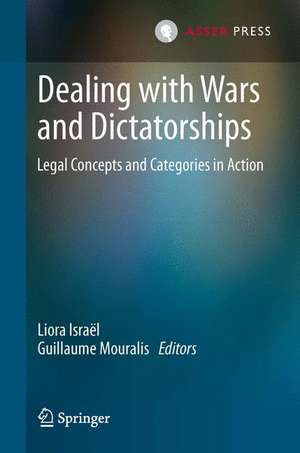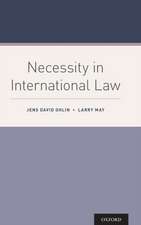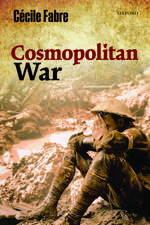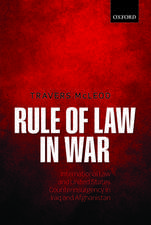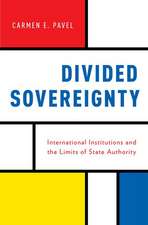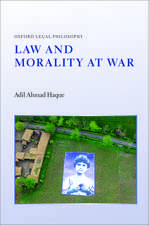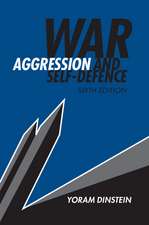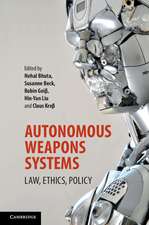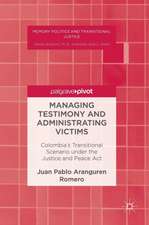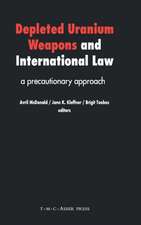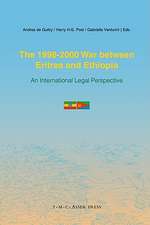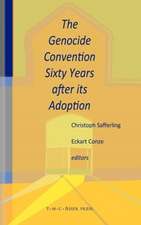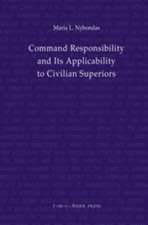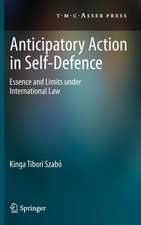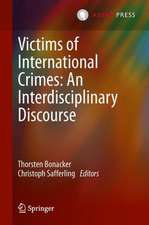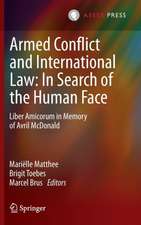Dealing with Wars and Dictatorships: Legal Concepts and Categories in Action
Editat de Liora Israël, Guillaume Mouralisen Limba Engleză Hardback – 16 dec 2013
Preț: 646.11 lei
Preț vechi: 760.13 lei
-15% Nou
Puncte Express: 969
Preț estimativ în valută:
123.63€ • 129.41$ • 102.90£
123.63€ • 129.41$ • 102.90£
Carte tipărită la comandă
Livrare economică 31 martie-14 aprilie
Preluare comenzi: 021 569.72.76
Specificații
ISBN-13: 9789067049290
ISBN-10: 9067049298
Pagini: 300
Ilustrații: XI, 269 p. 3 illus.
Dimensiuni: 155 x 235 x 22 mm
Greutate: 0.58 kg
Ediția:2014
Editura: T.M.C. Asser Press
Colecția T.M.C. Asser Press
Locul publicării:The Hague, Germany
ISBN-10: 9067049298
Pagini: 300
Ilustrații: XI, 269 p. 3 illus.
Dimensiuni: 155 x 235 x 22 mm
Greutate: 0.58 kg
Ediția:2014
Editura: T.M.C. Asser Press
Colecția T.M.C. Asser Press
Locul publicării:The Hague, Germany
Public țintă
ResearchCuprins
General Introduction.- “Épuration”: History of a Word.- Humanity Seized by International Criminal Justice.- Dealing with Collaboration in Belgium after the Second World War: From Activism to Collaboration and Incivism.- Transitional Justice as Universal Narrative.- The Invention of “Transitional Justice” in the 1990s.- “Transitional Justice” and National “Mastering of the Past”: Criminal Justice and Liberalization Processes in West Germany after 1945.- Poor Little Belgium? Belgian Trials of German War Criminals, 1944-1951.- From Revolution to Restoration. Transnational Implications of the Greek Purge of Wartime Collaborators.- The Defense in the Dock: Professional Purges of French Lawyers after the Second World War.- Law and the Soviet Purge: Domestic Renewal and International Convergences.- Circulation of Models of épuration after the Second World War: from France to Italy.- Reassessing the Boundaries of Transitional Justice: An Inquiry of Political Transitions, Armed Conflicts and Human Rights Violations.- The Emergence of Transitional Justice as a Professional International Practice.- The Uncertain Place of Purge within Transitional Justice, and the Limitations of International Law in the World’s Response to Mass Atrocity.
Notă biografică
Liora Israël is a sociologist at the École des Hautes Études en Sciences Sociales and assistant director of the Centre Maurice Halbwachs, Paris. Guillaume Mouralis is an historian and sociologist at the Centre National de la Recherche Scientifique and a member of the Institut des Sciences Sociales du Politique, Université Paris Ouest Nanterre.
Textul de pe ultima copertă
The 20th century saw an unprecedented number of major wars, conflicts, and massive human rights violations. From each emerged the desire to make sense of the recent past (and present) by imagining new ways of dealing with such events. In order to prevent new forms of violence, or to punish the persons responsible of past horrors, various solutions have been imagined, deployed, implemented, and discussed, at different levels.
This book is a reflection on the social and historical construction, appropriation, and circulation of categories, norms, and savoir-faire related to the ways social groups and institutions—state, judiciary, professional organizations—confront traumatic events. Even if there is a robust literature on purges and other mechanisms intended to deal with an authoritarian or violent past, written by authors belonging to numerous disciplines and exploring different periods and topics with a variety of theoretical and methodological backgrounds, our goal was to propose a more sociologically oriented model of analysis. Far from being only an intellectual frenzy, this orientation appears to be less normative than most “post-transitional” approaches and potentially more general than strictly monographic approaches. In doing so, our objective is not only to provide a critical approach, but also to sustain a more realistic view of this highly political and moral domain.
This book is a reflection on the social and historical construction, appropriation, and circulation of categories, norms, and savoir-faire related to the ways social groups and institutions—state, judiciary, professional organizations—confront traumatic events. Even if there is a robust literature on purges and other mechanisms intended to deal with an authoritarian or violent past, written by authors belonging to numerous disciplines and exploring different periods and topics with a variety of theoretical and methodological backgrounds, our goal was to propose a more sociologically oriented model of analysis. Far from being only an intellectual frenzy, this orientation appears to be less normative than most “post-transitional” approaches and potentially more general than strictly monographic approaches. In doing so, our objective is not only to provide a critical approach, but also to sustain a more realistic view of this highly political and moral domain.
Caracteristici
Examines what is today uncritically called “transitional justice” and how it has been described and understood since World War Two Focuses on the legal and political concepts used in everyday life and/or the ones mobilized in the academic work Examines the circulation of categories, know-how, arguments, among countries and periods Includes supplementary material: sn.pub/extras
